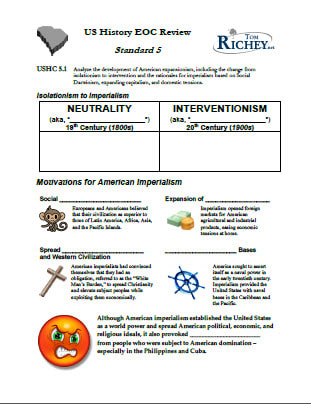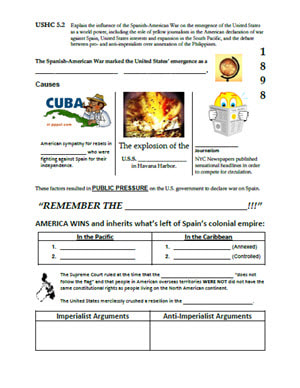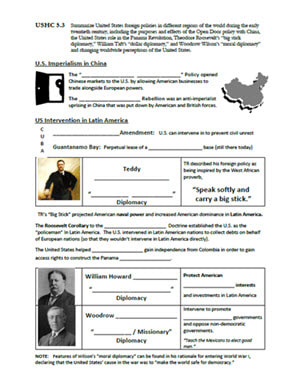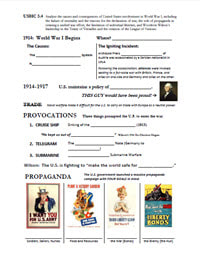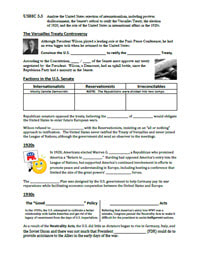Standard 5 of the US History EOC addresses the American foreign policy at the turn of the twentieth century, particularly on imperialist foreign policy, World War I, and the subsequent rejection of Wilsonian internationalism during the Versailles Treaty debate.
USHC 5.1 |
Analyze the development of American expansionism, including the change from isolationism to intervention and the rationales for imperialism based on Social Darwinism, expanding capitalism, and domestic tensions.
|
Video Lecture |
PowerPoint Slides |
Review Guide |
USHC 5.2 |
Explain the influence of the Spanish-American War on the emergence of the United States as a world power, including the role of yellow journalism in the American declaration of war against Spain, United States interests and expansion in the South Pacific, and the debate between pro- and anti-imperialists over annexation of the Philippines.
|
Video Lecture |
PowerPoint Slides |
Review Guide |
USHC 5.3 |
Summarize United States foreign policies in different regions of the world during the early twentieth century, including the purposes and effects of the Open Door policy with China, the United States role in the Panama Revolution, Theodore Roosevelt’s “big stick diplomacy,” William Taft’s “dollar diplomacy,” and Woodrow Wilson’s “moral diplomacy” and changing worldwide perceptions of the United States.
|
Video Lecture |
PowerPoint Slides |
Review Guide |
USHC 5.4 |
Analyze the causes and consequences of United States involvement in World War I, including the failure of neutrality and the reasons for the declaration of war, the role of propaganda in creating a unified war effort, the limitation of individual liberties, and Woodrow Wilson’s leadership in the Treaty of Versailles and the creation of the League of Nations.
|
Video Lecture |
PowerPoint Slides |
Review Guide |
USHC 5.5 |
Analyze the United States rejection of internationalism, including postwar disillusionment, the Senate’s refusal to ratify the Versailles Treaty, the election of 1920, and the role of the United States in international affairs in the 1920s.
|
Video LecturesI recorded these videos several years before the rest of the series, but they are still based on the same review guide so I don't see the need to re-publish them.
|
PowerPoint Slides |
Review Guide |

